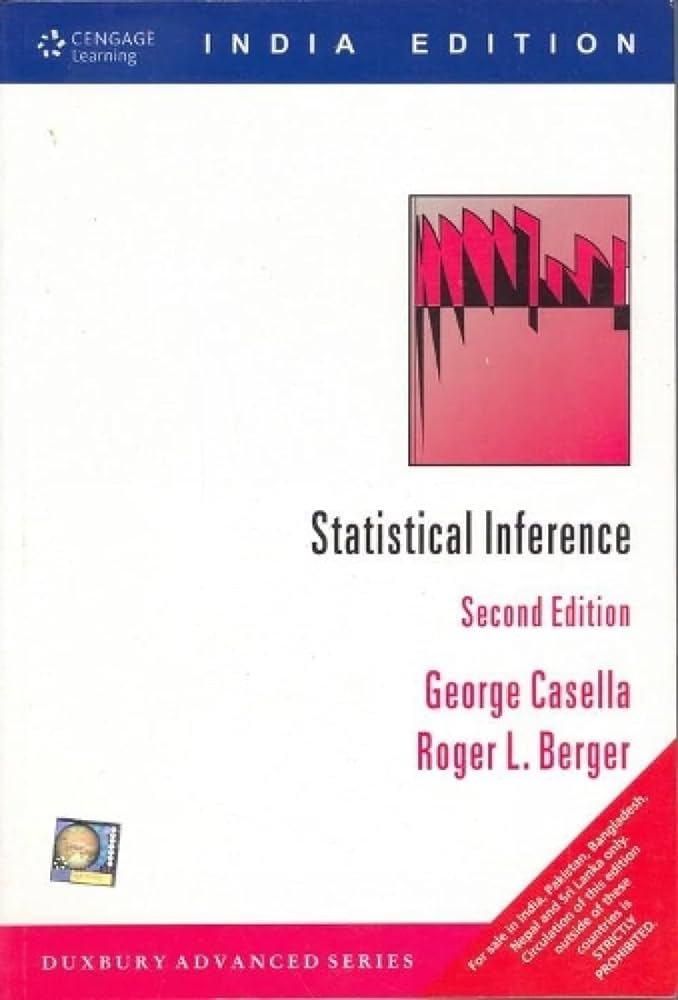If you’re searching for the best book for statistical inference, “Statistical Inference” by Casella and Berger stands out as a top choice. This book offers clear explanations and practical examples, making complex concepts more accessible. Whether you’re a beginner or an experienced statistician, you’ll find it invaluable for deepening your understanding. Dive into its pages and see why many consider it the best book for statistical inference.
Best Book for Statistical Inference
Statistical inference is a key component in the field of statistics. It involves making predictions or decisions based on data analysis. But with so many resources available, finding the best book for statistical inference can feel overwhelming. Additionally, if you’re interested in business, you might be looking for the Where to Buy Business Books in London. This comprehensive guide aims to alleviate that stress. We’ll explore some of the most recommended books on the subject, their unique features, and why they stand out.
Why Learn Statistical Inference?
Before diving into the books, let’s understand why learning statistical inference is crucial:
- Data-Driven Decisions: Statistical inference allows us to make informed decisions based on data, not just gut feeling.
- Predictive Power: It helps us predict future trends and outcomes, which is essential for business and scientific research.
- Understanding Uncertainty: It quantifies the uncertainty in our data, giving us a clearer picture of the reliability of our predictions.
Top Books on Statistical Inference
1. “Statistical Inference” by George Casella and Roger L. Berger
This book is often recommended for its clear explanations and comprehensive coverage of the core concepts in statistical inference.
- Core Topics: The book delves deeply into probability theory, estimation, and hypothesis testing.
- Mathematical Rigor: It offers a rigorous mathematical approach, making it suitable for students who are comfortable with calculus and linear algebra.
- Examples and Exercises: Numerous examples and exercises are included to help solidify understanding.
2. “All of Statistics: A Concise Course in Statistical Inference” by Larry Wasserman
Larry Wasserman’s book is a favorite among students for its concise and approachable style.
- Brief and Comprehensive: As the title suggests, it covers a broad range of topics in a concise manner.
- Accessible Language: The language is straightforward, making it easier for beginners to grasp complex concepts.
- Practical Examples: Real-world examples help illustrate the principles discussed in the book.
3. “Introduction to the Theory of Statistical Inference” by Hannelore Liero and Silvelyn Zwanzig
This book stands out for its focus on the theoretical foundations of statistical inference.
- Theory-Focused: It provides a thorough introduction to the theoretical aspects, making it ideal for students interested in the foundations of the subject.
- Structured Learning: The book is well-structured, with each chapter building on the previous one.
- Exercises for Mastery: Exercises are provided at the end of each chapter to test comprehension and reinforce learning.
Comparing the Books
To help you choose the best book for your needs, let’s compare the mentioned books based on some key criteria:
| Criteria | “Statistical Inference” by Casella and Berger | “All of Statistics” by Wasserman | “Introduction to the Theory of Statistical Inference” by Liero and Zwanzig |
|---|---|---|---|
| Depth of Content | High | Medium | High |
| Mathematical Rigor | High | Medium | High |
| Accessibility | Medium | High | Medium |
| Ease of Understanding | Medium | High | Medium |
| Exercises and Examples | High | High | Medium |
Understanding Key Concepts in Statistical Inference
Let’s break down some of the key concepts you’ll encounter in these books:
Probability Theory
Probability theory forms the foundation of statistical inference. It involves:
- Understanding random variables and their distributions.
- Learning about the laws of probability.
- Exploring concepts like expectation, variance, and covariance.
Estimation
Estimation is crucial for making predictions based on data. Key topics include:
- Point Estimation: Finding a single value as an estimate of an unknown parameter.
- Interval Estimation: Determining a range of values within which the parameter is expected to lie.
- Properties of Estimators: Understanding bias, consistency, and efficiency of estimators.
Hypothesis Testing
Hypothesis testing involves making decisions based on data. Important aspects include:
- Formulating null and alternative hypotheses.
- Choosing a significance level.
- Calculating test statistics.
- Making decisions based on p-values and confidence intervals.
Tips for Choosing the Right Book
Here are some tips to help you choose the best book for your needs:
- Assess Your Background: Consider your mathematical background and choose a book that matches your comfort level.
- Determine Your Goals: If you’re looking for a theoretical foundation, a more rigorous book may be suitable. For practical applications, a concise and accessible book might be better.
- Read Reviews: Check out reviews from other readers to get a sense of the book’s strengths and weaknesses.
- Sample Chapters: If possible, read sample chapters to see if the book’s style and approach resonate with you.
Additional Resources for Learning Statistical Inference
Books are a great resource, but they are not the only way to learn. Here are some additional resources to consider:
Online Courses
Online courses provide structured learning and often include video lectures, quizzes, and assignments. Some popular platforms include:
Tutorials and Blogs
Many websites and blogs offer free tutorials on statistical inference. These can be a great way to supplement your learning.
Practice Problems
Practice is key to mastering statistical inference. Consider websites that offer problems and solutions to test your understanding.
Choosing the best book for statistical inference depends on your learning style, background, and goals. Whether you prefer a rigorous mathematical approach or a concise, practical guide, there’s a book out there for you. Combining these books with additional resources like online courses and practice problems can help you master statistical inference and apply it effectively in your field.
Frequently Asked Questions
What are the key features to look for in a book on statistical inference?
When choosing a book on statistical inference, look for clear explanations, a variety of examples, exercises with solutions, and coverage of both theory and practical applications. A good book should also include sections on both frequentist and Bayesian approaches.
Is there a recommended book for beginners in statistical inference?
For beginners, “Statistical Inference” by George Casella and Roger L. Berger is an excellent choice. It provides a comprehensive introduction with clear explanations and numerous examples. The book covers essential concepts and includes exercises to help reinforce understanding.
How does “The Elements of Statistical Learning” compare to other books on statistical inference?
“The Elements of Statistical Learning” by Trevor Hastie, Robert Tibshirani, and Jerome Friedman is highly regarded for its in-depth discussion of modern statistical learning techniques. While it covers more advanced topics, it serves as a great complement to other foundational books by providing a broader perspective on applied statistical learning methods.
Which book is most suitable for advanced learners in statistical inference?
Advanced learners may find “Mathematical Statistics and Data Analysis” by John A. Rice particularly useful. The book delves into detailed theoretical aspects and offers a rigorous treatment of statistical models, making it ideal for those seeking a deeper understanding of statistical inference concepts.
Can you recommend a book that covers both theoretical and practical aspects of statistical inference?
“All of Statistics: A Concise Course in Statistical Inference” by Larry Wasserman is a great choice for readers who want a balance of theory and practical applications. The book covers a wide range of topics, providing both rigorous theoretical background and practical examples to illustrate key concepts.
Final Thoughts
For learning statistical inference, “Statistical Inference” by Casella and Berger stands out. The book offers clear explanations and extensive examples to build a strong foundation. Whether you’re a beginner or looking to deepen your understanding, this resource excels. Choosing the best book for statistical inference can significantly enhance your statistical skills.

